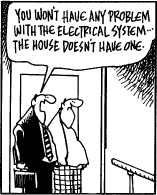Home > Home Buyers Learning Center > Step 9
9. Contingency Removal

A contingency is a term or condition written into an offer that must be met for it to become a binding contract. If you write into your offer that it is "contingent upon" a certain event, you’re saying that you will agree to the contract only if that event happens.
Most contracts to purchase real estate have contingencies. Some common contingencies are:
- Obtaining specific financing from the lender identified in the contract
- Satisfactory inspection of the home, pool, septic system, well or detached building
- Sale of your current home
- Review of homeowner’s or condominium association documents
If your offer is contingent upon a home inspection, you may want to choose a home inspector that is a member of the American Society of Home Inspectors (ASHI).

Contingencies have time limits for completion of inspections and procuring of documents. Home sale contingencies normally come with "kick out" clauses meaning the seller will continue to market the home for sale and should another acceptable offer be presented you will be given a short period of time normally 48 hours to remove the contingency for selling your home.
Homeowner’s and condominium associations have, by law, a certain period of time to produce the association documents. Included is the resale certificate that provides for an accounting of the dues paid and any repairs the seller is required to make in order to stay in compliance with association rules and regulations. The buyer is afforded a few days to look the documents over before deciding if they want to proceed or not with the purchase of the property. If you own a boat or recreational vehicle and plan to park it in your driveway there is no sense looking at homes governed by a homeowner’s association, they won’t allow it.
Upon completion of home inspections you will either indicate that no repairs are required or list the repairs you would like for the seller to make. There is a negotiation period established to limit the amount of time the buyer or seller is tied to the home inspection contingency. Contracts can be written whereby sellers agree to pay up to a limited amount for repairs to for example: appliances, fixtures, heating/cooling systems, termite treatments and moisture damage should these problems be discovered by you or property inspectors. If you are purchasing a bank owned property it will most likely be agreed to up front that the bank will not make any repairs and you are buying the property "as is, where is".

If you are not satisfied with the results of an inspection, or your loan is denied, or you are unhappy with the association rules and regulations or the seller invokes a "kick out" clause, both buyer and seller will execute a release agreement stipulating how the earnest money deposit is disbursed.
Most often, however, things work out. Once the term or condition written into the contract has been satisfactorily met, a contingency removal addendum is signed which includes the new provisions, if any, that have been agreed to. At this point everyone acts in good faith to ensure things proceed smoothly to closing.
Congratulations, You Have Graduated to the Next Step >>
Back to Top




